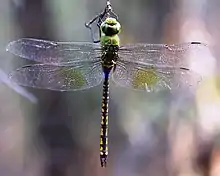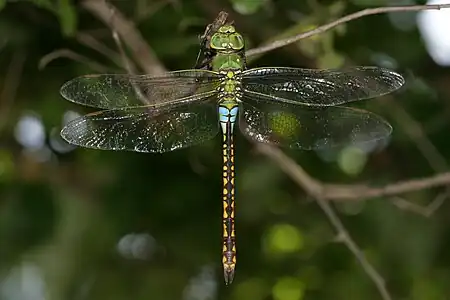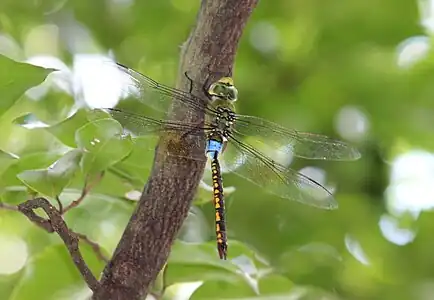Anax indicus
Anax indicus[2] is a species of dragonfly in the family Aeshnidae. It is found in India, Nepal, Pakistan, Sri Lanka, and Thailand.[1][3][4]
| Anax indicus | |
|---|---|
 | |
| male | |
 | |
| female | |
| Scientific classification | |
| Domain: | Eukaryota |
| Kingdom: | Animalia |
| Phylum: | Arthropoda |
| Class: | Insecta |
| Order: | Odonata |
| Infraorder: | Anisoptera |
| Family: | Aeshnidae |
| Genus: | Anax |
| Species: | A. indicus |
| Binomial name | |
| Anax indicus Lieftinck, 1942 | |
Description and habitat
It is a big dragonfly with blue eyes, pale green thorax and dark brown abdomen with bright yellowish-red markings on the sides. Its wings are transparent; but there are brown patches on the inner half of the hind-wings. Segment 1 and sides of segment 2 of the abdomen are pale green. The dorsum of segment 2 is blue with a narrow and broken transverse carina in the midst of the segment in addition to the broad terminal carinae. The dorsal side of segment 3 is blue with a black longitudinal mid-dorsal black line and sides are silvery white. The remaining segments are dark brown with yellowish-red dots on the sides. Segments 4 to 6 are with a pair of bright yellowish-red spots. On 7-8 these spots combine to form a continuous yellow band. Segments 9 to 10 are with a pair of large yellowish-red spots. Anal appendages are dark brown; the superiors have a triangular projection at the middle of their inner margin.[5][6][7]
 Male in Chinnar Wildlife Sanctuary
Male in Chinnar Wildlife Sanctuary_female_in_flight.jpg.webp) Female
Female_male.jpg.webp) Anal appendages (male)
Anal appendages (male)_female.jpg.webp) Anal appendages (female)
Anal appendages (female)_male.jpg.webp) Segment 2 of male
Segment 2 of male_female.jpg.webp) Segment 2 of female
Segment 2 of female
This dragonfly looks similar to Anax guttatus; but can be identifiable by contiguous yellow spots on the posterior abdomen segments (7-8). They are not connected in Anax guttatus.[5][6][8][9]
Females is similar to the male. But the blue on the dorsum of segment 2 will be broken up into four by a narrow brown mid-dorsal carina and a transverse line lying midway to form a cross like mark. Anal appendages are very broad and shaped like lance head.[5][6]
This species breeds in ponds, marshes and lakes.[1]
See also
References
- Mitra, A. (2010). "Anax indicus". IUCN Red List of Threatened Species. 2010: e.T169103A6565682. doi:10.2305/IUCN.UK.2010-4.RLTS.T169103A6565682.en. Retrieved 20 November 2021.
- Paulson, D.; Schorr, M.; Abbott, J.; Bota-Sierra, C.; Deliry, C.; Dijkstra, K.-D.; Lozano, F. (2023). "World Odonata List". OdonataCentral, University of Alabama. Retrieved 14 Mar 2023.
- Odonata: Catalogue of the Odonata of the World. Tol J. van , 2008-08-01
- K.A., Subramanian; K.G., Emiliyamma; R., Babu; C., Radhakrishnan; S.S., Talmale (2018). Atlas of Odonata (Insecta) of the Western Ghats, India. Zoological Survey of India. pp. 191–192. ISBN 9788181714954.
- F. F., Laidlaw (August 1921). "A List of the Dragonflies Recorded from the Indian Empire with Special Reference to the Collection of the Indian Museum: Part IV – Suborder Anisoptera: The Subfamily Aeschninae" (PDF). Records of the Indian Museum. XXII: 82–86 – via Zoological Survey of India.
- Lieftinck, M. A. Odonata of New Guinea. Treubia, 18 (3): 589-591.
- Fraser, F.C. (1921) Indian dragonflies. The Journal of the Bombay Natural History Society. 28: 115-117
- Farrell, Dennis (2011-07-24). "Anax indicus (Lieftinck, 1942)". Dragonflies & damselflies of Thailand. Retrieved 2018-03-08.
- Khan, Kawsar (2015-03-19). "Anax indicus (Lieftinck, 1942)". Dragonflies and Damselflies of Bangladesh. Retrieved 2018-03-08.
